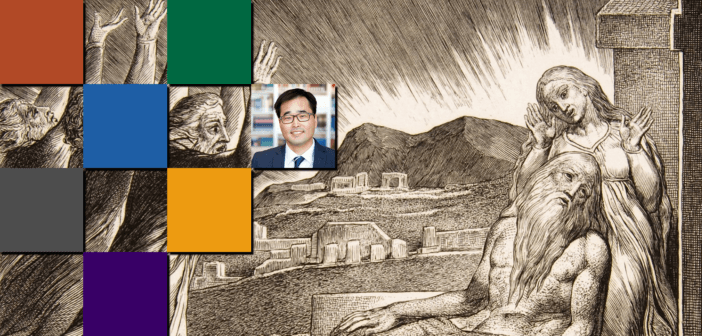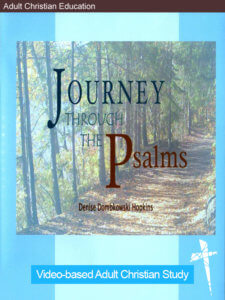What is trauma? And how can congregations be a space of healing for the traumatized? Lewis Center Director Doug Powe interviews Paul Cho, a professor of Hebrew Bible, on the nature of trauma and how Scripture is a resource for congregations journeying alongside the traumatized.
Listen to this interview or continue reading.
Doug Powe: You teach on trauma. Can you share how you help students define trauma?
Paul Cho: Most of my students have an interest in trauma either from personal experience or just from exposure to the concept at large. So, it’s important for me to honor their interest and experiences. But as students engage the subject, they soon find the experiences and definitions they carry into the classroom are multiple and diverse. So while affirming their own understandings of trauma, we also begin to explore a more diverse and complex understanding. We bring in formal definitions from scientific studies to better frame that conversation, whether we’re talking about individual psychological trauma or group trauma. I think the best definitions of trauma exist in the tension between what we ourselves experience and the larger scientific studies.
Doug Powe: Can you think of some common themes that run through the students’ own definitions of trauma, before you move to the scientific ways of unpacking trauma?
Paul Cho: I think a lot of students come to trauma either from a very particular place or from an overly generalized place. By particular, I mean thinking of trauma as simply what I experienced or what I know to have happened in the people around me, whether it’s sexual or racial in nature, or a personal experience of violence. Another particularity is to think about trauma only as PTSD. But that, of course, is not the only manifestation of trauma. The overgeneralized view is to think anything that is bad, sad, or tragic is traumatic. Obviously, there are many bad, sad and tragic things in our world. But they may not be traumatic in the narrow sense. So I think it’s a matter of both expanding one’s definition and framing it in a more rigorous way.
Communal trauma can work itself out in ways that dissolve the social and connective fabric of a group. Or it can work itself out in ways that actually reinforce the identity of the group.
Doug Powe: You’ve already mentioned that there is individual trauma and also communal trauma. Can speak to how these are different and how they are connected to one another?
Paul Cho: There are a variety of ways to think about communal trauma which affects a large group of people. Somewhat ironically, communal trauma can work itself out in a centrifugal way. That is to say, it dissolves the social and connective fabric of a group. Or it can work itself out in centripetal ways where it actually reinforces the identity of the group. Communal trauma can be defined as a large group experiencing the same event that is traumatic to individuals within that group. And in such cases, it can dissolve the trust and connectivity of the group. This has a centrifugal effect and can dissolve that community.
But the ways the communal experience of trauma is represented to the group can, in fact, have a centripetal force. This centripetal force works itself out in the form of narratives. Experiences of trauma usually engender a need for explanations, most often taking the form of narratives. And the narrative is formulated, not by individuals or by all members of that group, but rather by people who have a platform, people who have the ear of the community. And how that narrative, that story, that explanation is crafted comes to define, at least in part, the identity of that group. It can, in fact, create a new identity, and perhaps even a stronger identity, because of the emotional energy released by the experience of trauma. But obviously, depending on the veracity, or the worth, or the value of that particular narrative, the identity created can be either healthy or less healthy.
Doug Powe: Do you think reading the Hebrew Bible through this lens of trauma can help us think about our own narratives in life? Do you think the text can open up places for us to see ourselves?
Trauma is part of the historical and social reality behind the Hebrew Bible. Recognizing that our pain and sufferings were also experienced by the people in Scripture makes it more proximate to our lives and our existence.
Paul Cho: For those of us who regard Scripture as authoritative and valuable in our lives, it’s important to recognize that trauma is part of the historical and social reality behind the Hebrew Bible. The Hebrew Scriptures reflect pain and sorrow and confusion that arises from experiences of trauma. We see this everywhere throughout Scripture. Recognizing that our pain and sufferings were also experienced by the people in Scripture makes it more proximate to our lives and our existence. To identify and recognize the laments, the anger, the emotions, and the confusion embedded in Hebrew Scripture is to say, “That’s where I can find myself connecting with this ancient Scripture.” And with that initial act of identification, one can begin narrating one’s own journey through trauma alongside Scripture. If one sees that the biblical writers began with pain and suffering and trauma, but they were able to get to a different place, then maybe the reader can journey alongside them. This analogy between my own existential experience and the experiences embedded in the pages of Scripture, allows us to co-journey with the biblical narratives. We can find our narratives inflected and reflected in Scripture and we can see the truth of Scripture reflected in our lives, as well.
Doug Powe: I know one of your favorite books is the book of Job. Can you speak about Job and how the book of Job helps us reflect on our personal lives?
Paul Cho: I think the book of Job is a gift — not only to the church and the synagogue, but to the world — a world that knows suffering and oppression. Because it does not shy away from complexity, which we know to be real, which we know to be authentic. Had the book of Job given us easy answers to these difficult existential theological questions, we would have easily dismissed the book. But because of its complexity and its nuance, I think it can speak to us in a genuine way.
The book of Job is a gift, not only to the church and the synagogue, but to a world that knows suffering and oppression. Because it does not shy away from complexity.
Many Christians and Jews may simply know Job as that patient and pious individual who did not curse God, who somehow was able to bless God, despite his family, his wealth, his property, and his social circle having been decimated. But beginning with chapter three, Job enters into speech that is full of sorrow, pain, confusion, doubts, and questions about everything. Job questions everything because his whole world has been shattered — his sense of belonging, his sense of relationship to God, and his sense of self-worth. And this catapults into a series of questions and laments that I think are a gift. They give us scriptural and theological space in which to engage in similar considerations, similar meditations, similar outbursts and anger.
There is a point at which one of the friends says to Job, “For your sake, because of you, should the world or the earth be abandoned?” That is to say, “Should we get rid of and question everything that we’ve known about the world simply because you are suffering?” And of course, the friend’s answer to what he thought was a rhetorical question was, “No, you’re not that important.” But I think what the book of Job in fact says is, “Yes, because of your individual suffering and your experience of pain, the world should be overturned.”
We realize that our suffering matters not only to ourselves, but also to God. Because God, in fact, addressed Job at the end. And to realize that our suffering, confusion and pain are of theological importance and concern to God is a great affirmation of the fact that suffering is hard and difficult. But it is not without a certain value to God, to ourselves, and to one another. We should take it seriously and tend to it.
Doug Powe: Looking to the book of Ruth and thinking about Ruth and Naomi following behind those going out in the harvest and picking up what was left over, the community had established this practice to take care of people, to respond to the trauma of those who were struggling and doing without. The notion of having systems to respond to trauma is important for congregations today, as well. Can you reflect on the thinking behind that text and what we can do in our lives?
Paul Cho: We all can and should aspire to do this in our congregations. Anyone experiencing trauma needs to feel a sense of connection. And congregations are very important groups. Judith Hermann, who taught at Harvard Medical School, is an expert on trauma. And she identifies the three steps for recovery. First, establish safety for the person who has experienced trauma. Second, have a place in which this person can both reconstruct the traumatic experience and mourn that experience. Third, have a place where this person can reconnect to individuals and groups.
Congregations can play a vital role in creating safe space for traumatized persons and helping them reconnect to society. They can contribute to the healing of traumatized individuals in healthy and helpful ways.
Not many congregations or pastors are equipped to help a traumatized person reconstruct their trauma experience. That should be left in the hands of psychologists and psychiatrists. But congregations can play a vital role in creating safe space for traumatized persons and helping them reconnect to society. Churches must play this role as they minister in a world that knows trauma too well, especially as we emerge from the pandemic health crisis and confront the racism that continues to afflict our society in such deep and painful ways.
Congregation can contribute to the healing of traumatized individuals in healthy and helpful ways. But churches are also places where we can build the capacity for resilience. Resilience comes not by saying “Let’s be resilient in the face of trauma.” But it develops in healthy communities where people can have conversations, where they can agree and disagree, and talk with people they like them and people who aren’t like them. A loving community where members respect each other will, in fact, make their congregants healthy and resilient. This is an important role congregations can and should play.
In the book of Ruth, there are societal structures and practices that recognize those who live on the margins, always a little too close to danger. To recognize the existence of such brothers and sisters among us, and to make room for them, is an important practice for all of us as we go about the ministry of sharing Christ’s love and mercy and peace.
Doug Powe: The pandemic has been traumatic for many people in a variety of ways. If you were going to offer a congregational Bible study, how would you frame it to help a church think about building a healthier community as we come out of the pandemic?
The book of Psalms reflects the fullness of our emotional responses to trauma and to life in general. It makes space for people to celebrate and to mourn, not only by themselves, but with each other.
Paul Cho: First, I would recommend reading the book of Psalms. The Psalms reflect the entire “anatomy of the human soul,” as John Calvin put it. It expresses our laments, our mourning, our doubts, our anger. But of course, it also expresses our thanksgiving, joy, and praise. I think the book of Psalms is important because it reflects the fullness of our emotional responses to trauma and to life in general. It makes space for people to celebrate and to mourn, not only by themselves, but with each other. I think the Psalms are uniquely important because they bring us together side-by-side before the presence of God. And this is something unique that churches and other worshipping communities can offer to the world. To say, “Here is a person who is mourning and angry because of their experience of trauma coming out of this pandemic. And we stand with him or her in the presence of God as a sanctified community.” That can be quite affirming for individual members as well as the congregation as a whole.
You might have guessed that my other recommendation is the book of Job. In fact, I am in conversation with people at Wesley Theological Seminary, as well as people in South Africa and Australia, to launch what I’m calling “The Job Project.” The project is, in fact, very simple. Just to read the book of Job, or at least parts of the book of Job, with congregations and communities who have suffered in ways known and unknown. And I think the book of Job is important because it recognizes, as I’ve stated before, the reality of pain and the horror that we have experienced.
Coming out of the pandemic, our experiences of horror are diverse. For young people, losing the ability to connect with friends has been devastating — socially, psychologically, emotionally, also probably physically. The loss of jobs for many people around the country and around the world has been devastating. The loss loved ones, neighbors and friends has taken a humongous toll. And we as Americans are not good at lamenting. We are not good at recognizing that death stings and has reign over us. The book of Job helps us confront these realities. It also creates space for people to feel empowered, encouraged, and affirmed in speaking their laments and their sorrow. The leaders of such Bible studies must also be mindful of the potential for toxicity, even when reading of Scripture. There are unhelpful ways in which people might release emotions. We need provide the space to embrace such a person, but also abide by safety measures. So I think the book of Psalms is an easy recommendation. Beginning to end. Not only Psalm 23, but also Psalm 137. Reading a diversity of Psalms is important. And also the book of Job is helpful, especially with a guiding hand. Those are my two recommendations.





